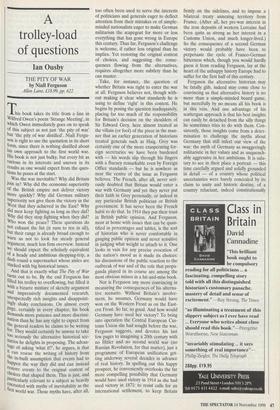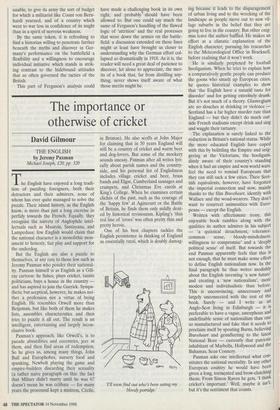A trolley-load of questions
Ian Ousby
THE PITY OF WAR by Niall Ferguson Allen Lane, £18.99, pp. 622 This book takes its title from a line in Wilfred Owen's poem 'Strange Meeting', in which Owen immediately goes on to speak of this subject as not just 'the pity of war' but 'the pity of war distilled'. Niall Fergu- son is right to use the quotation in its short form, since there is nothing distilled about his own approach to the first world war. His book is not just bulky, but every bit as Various in its interests and uneven in its results as one would expect from the ques- tions he poses at the start. , Was the war inevitable? Why did Britain Join in? Why did the economic superiority of the British empire not deliver victory more quickly? Why did German military superiority not give them the victory in the West that they achieved in the East? Why did men keep fighting as long as they did? Why did they stop fighting when they did? Who won the peace? These questions do not exhaust the list (it runs to ten in all), but their range is already broad enough to Warn us not to look for steady general argument, much less firm overview. Instead we should expect the scholarly equivalent of a heady and ambitious shopping-trip, a dash round a supermarket whose aisles are stacked with big historical issues. And that is exactly what The Pity of War turns out to be. By the end Ferguson has filled his trolley to overflowing, but filled it with a bizarre mixture of sketchy argument and impressively documented research, unexpectedly rich insights and disappoint- tngly shaky conclusions. On almost every Page, certainly in every chapter, his book demands more patience and more discrimi- nation than he has any right to expect from the general readers he claims to be writing for. They would certainly be unwise to take too seriously the alternative historical sce- narios he delights in proposing. The advan- tage of asking 'what if?', he argues, is that It can rescue the writing of history from the in-built assumption that events had to happen the way they did and can instead restore events to the original context of Choices that shaped them. This is just, and Particularly relevant to a subject as heavily first with myths of inevitability as the urst world war. Those myths have, after all, too often been used to serve the interests of politicians and generals eager to deflect attention from their mistakes or of simple- minded nationalists eager to make German militarism the scapegoat for more or less everything that has gone wrong in Europe this century. Thus far, Ferguson's challenge is welcome, if rather less original than he implies. Yet restoring the original context of choices, and suggesting the conse- quences flowing from the alternatives, requires altogether more subtlety than he can muster.
Take, for instance, the question of whether Britain was right to enter the war at all. Ferguson believes not, though with- out making it clear what standards he is using to define 'right' in this context. He begins by posing the question inadequately, placing far too much of the responsibility for Britain's decision on the shoulders of Sir Edward Grey, here almost treated as the villain (or fool) of the piece in the man- ner that an earlier generation of historians treated generals such as Haig. Grey was certainly one of the more exasperating for- eign secretaries we have been burdened with — his words slip through his fingers with a fluency remarkable even by Foreign Office standards — but he is nowhere as near the centre of the issue as Ferguson believes. The French, after all, never seri- ously doubted that Britain would enter a war with Germany and yet they never put their faith in Grey personally, or indeed in any particular British politician or British government. It has never been the French habit to do that. In 1914 they put their trust in British public opinion. And Ferguson, most at home with issues that can be quan- tified in percentages and tables, is the sort of historian who is never comfortable in gauging public opinion and never sensitive in judging what weight to attach to it. One looks in vain for any precise evocation of the nation's mood as it made its choices: his discussions of the public reaction to the outbreak of war and of the role that propa- ganda played in its course are among the most obvious misses in a hit-and-miss book.
Nor is Ferguson any more convincing in measuring the consequences of his alterna- tive scenario. Without Britain's involve- ment, he assumes, Germany would have won on the Western Front as on the East- ern Front. So far, so good. And how would Germany have used her victory? To bring into operation the Central European Cus- toms Union she had sought before the war, Ferguson suggests, and devotes his last few pages to imagining a 20th century with no Hitler and no second world war (no Russian Revolution, for that matter), just a programme of European unification get- ting underway several decades in advance of real history. In spelling out this happy prospect, he conveniently overlooks the far more compelling possibility that Germany would have used victory in 1914 as she had used victory in 1871: to resist calls for an international settlement, to keep Britain firmly on the sidelines, and to impose a bilateral treaty annexing territory from France. (After all, her pre-war interest in the iron deposits of western Lorraine had been quite as strong as her interest in a Customs Union, and much longer-lived.) So the consequence of a second German victory would probably have been to perpetuate the cycle of Franco-German bitterness which, though you would hardly guess it from reading Ferguson, lay at the heart of the unhappy history Europe had to suffer for the first half of this century.
Ferguson the alternative historian may be fatally glib, indeed may come close to convincing us that alternative history is no more than a simple-minded board game, but mercifully by no means all his book is in this vein. And one advantage of his scattergun approach is that his best insights can easily be detached from the silly things he sometimes tries to do with them. Con- sistently, those insights come from a deter- mination to challenge the myths about Germany that still infect our view of the war: the myth of Germany as swaggeringly militaristic in her values and as unquench- ably aggressive in her ambitions. It is salu- tary to see in their place a portrait — this time carefully argued and solidly grounded in detail — of a country whose political uncertainties were barely concealed by its claim to unity and historic destiny, of a country reluctant, indeed constitutionally unable, to give its army the sort of budget for which a militarist like Count von Bern- hardi yearned, and of a country which went to war less in confidence of its might than in a spirit of nervous weakness.
By the same token, it is refreshing to find a historian willing to penetrate further beneath the myths and discover in Ger- many's performance on the battlefield a flexibility and a willingness to encourage individual initiative which stands in strik- ing contrast to the hidebound attitudes that so often governed the tactics of the British.
This part of Ferguson's analysis could have made a challenging book in its own right, and probably- should have been allowed to. But one could say much the same of Ferguson's handling of the flawed logic of 'attrition' and the real processes that wore down the armies on the battle- field: a discussion extended on these lines might at least have brought us closer to understanding why the German effort col- lapsed so dramatically in 1918. As it is, the reader will need a great deal of patience to discover, let alone to appreciate, the mer- its of a book that, far from distilling any- thing, never shows itself aware of what those merits might be.



















































































 Previous page
Previous page